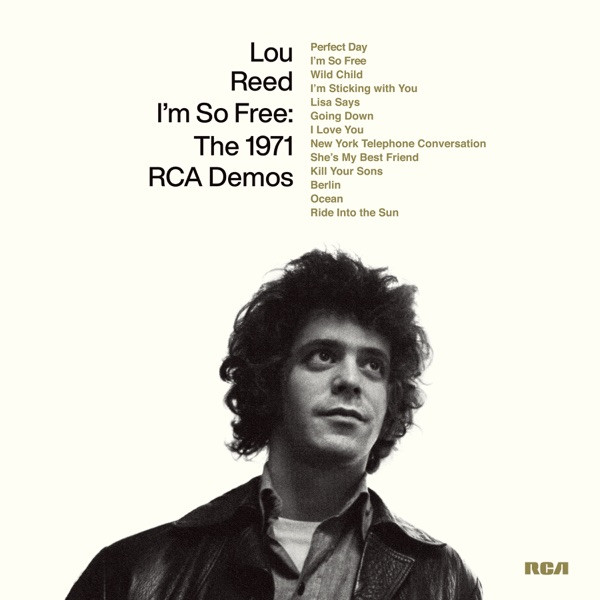 I’m So Free: The 1971 RCA Demos was one of those fifty-year copyright dumps that collectors trawl the file-sharing sites for every December, but then RCA put it out as a Record Store Day exclusive with an eye-catching cover and liner notes, and eventually for streaming with four more songs. These are basic acoustic guitar and vocal run-throughs, recorded professionally, of songs that would be considered for his first solo album. Every song that would appear there is auditioned here, including the leftovers from the last days of the Velvet Underground. We also get previews of later album cuts, including “Perfect Day”, “New York Telephone Conversation”, “Kill Your Sons” (with war-protest lyrics), and “She’s My Best Friend”, as well as a charming “I’m Sticking With You”. Throughout he’s immersed in each performance, laughing at any lyrical flubs, and instructing the engineer where the breaks are and when to fade.
I’m So Free: The 1971 RCA Demos was one of those fifty-year copyright dumps that collectors trawl the file-sharing sites for every December, but then RCA put it out as a Record Store Day exclusive with an eye-catching cover and liner notes, and eventually for streaming with four more songs. These are basic acoustic guitar and vocal run-throughs, recorded professionally, of songs that would be considered for his first solo album. Every song that would appear there is auditioned here, including the leftovers from the last days of the Velvet Underground. We also get previews of later album cuts, including “Perfect Day”, “New York Telephone Conversation”, “Kill Your Sons” (with war-protest lyrics), and “She’s My Best Friend”, as well as a charming “I’m Sticking With You”. Throughout he’s immersed in each performance, laughing at any lyrical flubs, and instructing the engineer where the breaks are and when to fade.
 This snapshot of the artist stepping out is particularly interesting when compared to the album that followed soon afterwards. As the first release in the projected Lou Reed Archive Series, Words & Music, May 1965 presented the contents of a demo tape he recorded then mailed himself to preserve its authenticity. Dating from before the recordings heard in the Peel Slowly And See box, he’s still firmly in the thrall of Bob Dylan, from the delivery to the fingerpicking, even on songs we’d get to know via the Velvets. John Cale helps out on several songs, including the immortal “Buttercup Song”, which was teased for decades as “Never Get Emotionally Involved With A Man, Woman, Beast Or Child”, and takes the lead vocal on “Wrap Your Troubles In Dreams”, which features that same maddening single beat on a sarinda as on the box. “Men Of Good Fortune” would be a title he’d use eventually, but not with these words, sung from the point of few of a fair maiden. The other “new” songs are of varying interest, though “Stockpile” has rocking promise. And the early version of “Pale Blue Eyes” is lovely. (As a bonus for some editions of the album, six cuts go even further back, as for as 1958 for his own doo-wop composition “Gee Whiz”, then up to 1963 or 1964 for two Dylan covers—an instrumental “Baby Let Me Follow You Down” and “Don’t Think Twice, It’s All Right” with new words, both with harmonica—plus a run through “Michael, Row The Boat Ashore” and two nondescript blues.)
This snapshot of the artist stepping out is particularly interesting when compared to the album that followed soon afterwards. As the first release in the projected Lou Reed Archive Series, Words & Music, May 1965 presented the contents of a demo tape he recorded then mailed himself to preserve its authenticity. Dating from before the recordings heard in the Peel Slowly And See box, he’s still firmly in the thrall of Bob Dylan, from the delivery to the fingerpicking, even on songs we’d get to know via the Velvets. John Cale helps out on several songs, including the immortal “Buttercup Song”, which was teased for decades as “Never Get Emotionally Involved With A Man, Woman, Beast Or Child”, and takes the lead vocal on “Wrap Your Troubles In Dreams”, which features that same maddening single beat on a sarinda as on the box. “Men Of Good Fortune” would be a title he’d use eventually, but not with these words, sung from the point of few of a fair maiden. The other “new” songs are of varying interest, though “Stockpile” has rocking promise. And the early version of “Pale Blue Eyes” is lovely. (As a bonus for some editions of the album, six cuts go even further back, as for as 1958 for his own doo-wop composition “Gee Whiz”, then up to 1963 or 1964 for two Dylan covers—an instrumental “Baby Let Me Follow You Down” and “Don’t Think Twice, It’s All Right” with new words, both with harmonica—plus a run through “Michael, Row The Boat Ashore” and two nondescript blues.)
Together these albums are certainly essential for collectors. For the rest of the world, they actually show a kinder, gentler Lou who just wanted to write catchy songs, rather than the grouch determined to shock and upset.
Lou Reed I’m So Free: The 1971 RCA Demos (2022)—3
Lou Reed Words & Music, May 1965 (2022)—3
No comments:
Post a Comment